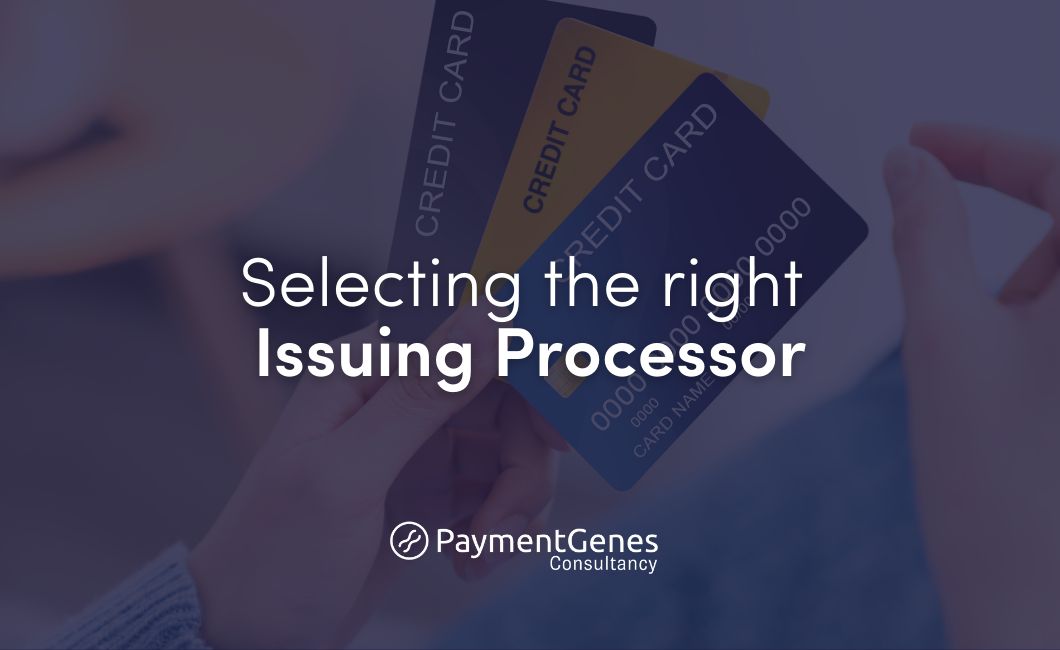If you are considering adding a payment card to your value proposition you will soon realize that there are many things to consider and questions that will arise. What card product makes sense to offer? What are the regulatory requirements? What technologies are available? How will I integrate the functionalities into my existing proposition? And the most important one, what companies should I partner with in order to launch a successful card product in the market?

In this article, we will provide an overview of card-issuing services, highlight the benefits of launching a card program, and guide businesses in selecting the right issuing processor. We will also emphasize the importance of assessing the business' needs, evaluating the issuing processor’s capabilities, and making an informed decision.
In order to select the right issuing processor for your business you first need to understand what an issuing processor is, its role and position in the four-corner model, and a bit of terminology.
Bear with us.
First, issuing processors typically hold an Electronic Money Institution (EMI) license from a national regulator or partner with BIN sponsors who hold such a license. This enables the issuing processor to provide payment and electronic money-issuing services to other businesses so these businesses are able to complement their service offering with payment products.
"The number of EMIs in the EU and UK has increased by 44% over the last 5 years." - TheBanks.eu, 2024.
Many of the innovative issuing processors have become a one-stop-shop for easily managing a card program for non-licensed entities. The four key responsibilities of the issuing processor are:
Second, the role and position of the issuing processor in the four-corner model. The issuing processor is positioned in the lower-left corner of the model and is licensed by a national regulator and a card scheme (e.g. Visa, Mastercard) and therefore licensed to issue cards to businesses and consumers. Typically, issuing processors, or their BIN sponsors, are licensed as EMIs and have the ability to offer payment services and issue electronic money to their customers.

Finally, a bit of terminology. When researching issuing processors, you will soon find that there are also companies that are only processing transactions, they are usually referred to as issuer processors. These companies typically only perform the role of the processor, which means they are not licensed by a regulator, but they are licensed by Visa and/or Mastercard and allowed to process their transactions for another licensed entity. For a non-licensed entity, this is usually when a BIN sponsor comes in to provide the necessary regulatory licensing for card programs.
Then the Issuer, which is a bit of a catch-all term, but in the four-corner model, we use it as the company that is legally responsible for issuing the card to the cardholder. Following that logic, the issuing processor can also be the issuer.
To summarize:
Are you still with us? 🙂
In today's highly competitive financial industry, offering payment cards such as credit, debit, or prepaid has become a necessity for different types of businesses that are looking to expand their financial services portfolio and increase revenue or loyalty with their customers. We have seen a large uptake in companies that are adding card-issuing capabilities in the following industries: mobility (incl. fleet & fuel), employee benefits, expense management, government, alternative lending, payouts, and many others.
The offering of a card program is not the core of the business but can be a means to an end and to complement the business’ value proposition. For example, an expense management company that also offers payment cards to their customers next to their SaaS solution, or mobility as a service provider that offers various In-App payment methods through e-commerce and also wants to offer physical forms of payment through a card.
Some of the benefits can be:

Before selecting an issuing processor, businesses should assess the requirements, their needs, and objectives to ensure that they make an informed decision. Key factors to consider when assessing the business needs include:
When selecting the right issuing processor a few important factors need to be considered before you can make the right decision.
After the company determined its strategic objectives for the card program the right partners will have to be sourced and a decision has to be made on who to work with. The decision-making process should include the following:
.jpeg)
It is crucial to choose a partner that has the right capabilities for your program that has a strong track record and preferably one that can offer case studies or references in similar or related industries.
Finally, take the time to assess the costs associated with each card issuing services provider. While it may be tempting to choose the provider with the lowest costs, be sure to consider the value that each provider brings to the table and how it can impact your card program's success in the long run.
With our extensive network within payments and Fintech and our experience with supporting companies making the right decisions PaymentGenes Consultancy can also support this phase of your project.
At PaymentGenes Consultancy - Issuing Services, we offer end-to-end consultancy services to help businesses successfully launch their card programs. Our issuing team has extensive market knowledge, and experience in navigating regulatory compliance, and card scheme requirements to ensure that your card program realizes its potential and meets your business objectives
If you're interested in launching a card program or adding payment functionality to your proposition, contact us today to learn how we can help you achieve your goals.
Co-Head of Consultancy & Practice Lead Banking, FinTech & Mobility
Co-Head of Consultancy & Practice Lead Banking, FinTech & Mobility